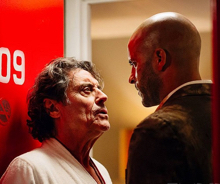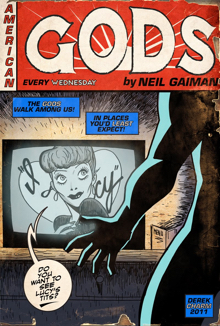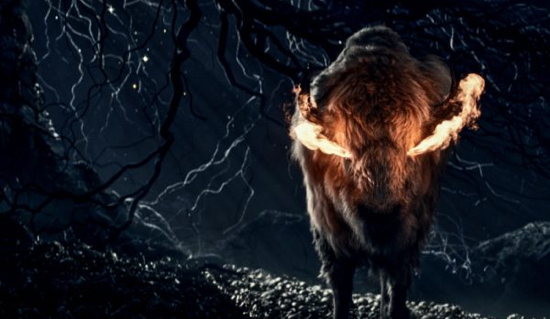Martha Thomases: Gods and Starz
 Forgive me, Constant Reader, but I am still somewhat hungover from my Eisner Awards weekend. As evidence, I tell you that I have the new issue of one of my favorite titles, Bitch Planet, in my apartment, but I have not yet read it.
Forgive me, Constant Reader, but I am still somewhat hungover from my Eisner Awards weekend. As evidence, I tell you that I have the new issue of one of my favorite titles, Bitch Planet, in my apartment, but I have not yet read it.
(I may read it during the course of writing this, because I plan to have lunch today. Stay tuned.)
So this week, I plan to talk about something that is not comics, but comics-adjacent, American Gods, the new series on Starz based on the novel by Neil Gaiman.
My colleagues in this space, Emily Whitten and Mindy Newell, have already written about the great cast and the tight scripting. I want to talk about some aspects of the show that are more ephemeral.
I haven’t read American Gods since it was published in 2001, but I remember being knocked out by it. The story of a war was not that unusual, but the fighters were, battles between the old gods (from Europe and Asia and Africa, like Odin and Anansi and Star) and the new gods (technology, media, celebrity). I mean, I already loved Neil, both as a person and as a writer, and his previous novel, Neverwhere, had been fun, but I thought American Gods was a great leap forward. It had an empathy towards its characters that I found to be much more personal and nuanced than the previous book. In fact, I considered it to be downright politically radical.
All these years later, my memories of the story have faded. There are some vivid images, notably a vignette in a taxi cab, but I don’t remember a lot about the plot or the characters. I am old. I have a lot of characters already in my brain, and I try to prioritize remembering the ones in real life.
 I was excited to sit down with my brand-new subscription to the Starz channel on Sunday night, a bit nervous because the early reviews I’d read all talked about how violent the series was. Sure enough, the opening scene looked like it had been dipped in henna. And yet, it didn’t give me the icks. Later, there was not only more blood, but walks through a forest filled with skulls, threatening skies and ominous, discordant music.
I was excited to sit down with my brand-new subscription to the Starz channel on Sunday night, a bit nervous because the early reviews I’d read all talked about how violent the series was. Sure enough, the opening scene looked like it had been dipped in henna. And yet, it didn’t give me the icks. Later, there was not only more blood, but walks through a forest filled with skulls, threatening skies and ominous, discordant music.
It wasn’t scary. It was quite lovely. And even though he hadn’t had anything to do with it (that I know about), it seemed like Dave McKean might have influenced the production design, at least for those scenes. They shared his sense of chaotic beauty.
The acting is terrific, and the casting superb. My foggy memories of the characters flash a bit, but I think I would relate to them just as much without reading the book. Even in the most dire circumstances, the actors seem to be having a great time, especially Ian McShane.
American Gods remains a political fable, albeit perhaps a different one than I read in 2001. My sympathies in the war among the gods remains with the older deities, although my mistrust of the whole lot of them is still strong. In this time, unlike the turn on the century, the war is also played out between the cities and the small towns, the coasts and the flat fly-over country. When there is a fight in a bar in the first episode, I have no doubt that the humans who watch are Trump voters.
Do I think that the old gods are Republicans and the new gods are Democrats? Hell, no. Neither do I think their worshippers divide up quite so simply. I think there are plenty of rural folks who love celebrities and smart phones. I think lots of urban hipsters would drink mead if it was offered. And I think all too many of us, no matter where we live or what we believe, would spill blood to get what we want.
This has been my first week with Starz. When I called my cable company to add it, I specifically told them I wanted it for American Gods. I see that they also have the new Ghostbusters. So I can have my Neil fix and Kate McKinnon without having to find the remote. That’s one less sacrifice to the tech gods.












